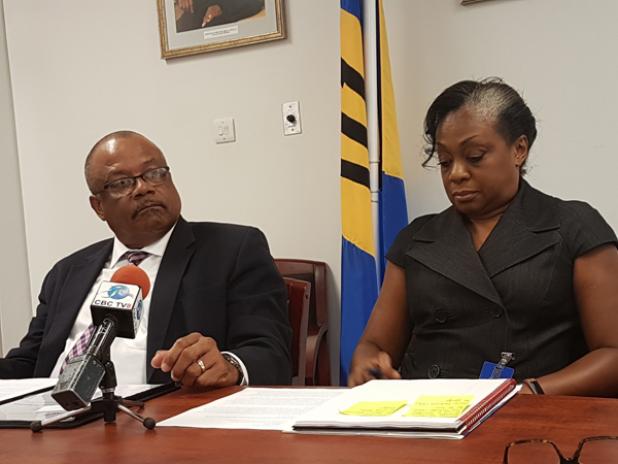
Minister of Health, John Boyce (left) and Dr. Lorna M. English, the Deputy Chief of the Global Noncommunicable Diseases Branch of the United States Centers for Disease Control and Prevention, at the press conference, at the Ministry of Health Frank Walcott Building, Culloden Road, St Michael headquarters.
Treatment protocol to expand
THE pilot project of a hypertension treatment protocol, launched in Barbados in 2015, is being described by authorities as successful.
Minister of Health, John Boyce, reported to the media that while the Standardized Hypertension Treatment Project (SHTP) which was launched at the Winston Scott and Edgar Cochran Polyclinics, has proven to be beneficial to the island’s health care system; efforts are now being made to use the treatment protocol at all polyclinics.
Speaking during a press conference at his Ministry’s Frank Walcott Building, Culloden Road, St Michael headquarters, yesterday, Minister Boyce said starting a new programme is never easy and although there were
challenges throughout the 18 month programme, it must be highlighted that there were successes as well.
However, according to Boyce, analysis of the programme indicated that there is significant benefit to be obtained by use of a core set of anti-hypertensives in the management of hypertension. “I am very proud and
delighted to let you know that the Barbados Drug Service provides one of the broadest selections of high quality and efficacious drugs for management of non-communicable diseases such as hypertension.
“The protocol produced has led to some positive change in the prescribing habits of our primary care physicians, better blood pressure control among our clients and a more engaged patient,” he said.
The Minister indicated that the continued success of the programme will require commitment from the country’s primary care physicians, pharmacists, medical records officers, dieticians, as well as patients.
“To make this programme viable, we need a health information system that can streamline care with the ability to analyse and predict service use.
“I am happy to report that the Health Information System (HIS), known as Med-Data, is now functional in all our polyclinics with modules currently being added for maternal and child health,” Boyce said.
Dr. Lorna M. English, the Deputy Chief of the Global Noncommunicable Diseases Branch of the United States Centers for Disease Control and Prevention, said based on the positive results from the Barbados pilot, the Center along with the World Health Organisation (WHO), the Pan-American Health Organisation (PAHO) and other global partners, integrated the use of the evidence-based tools and practices that were promoted and demonstrated by the SHTP into the technical packages of a programme called the Global Hearts Imitative. She said the tools developed for the Global Hearts technical packages reflect lessons learned in Barbados.
The key elements of the SHTP applied throughout the technical packages include: standardized evidence based treatment protocols, team-based care, access to medicines, registries for patient monitoring and evaluation.
“Barbados and the PAHO region are global leaders in moving this work forward. It is no surprise that many other countries throughout the world are interested in applying the same simple cost-effect approach. Countries are already beginning to use tools from the Global Hearts technical packages, but as the programme scales up globally, we want to remember how Global Hearts got started, and make sure that Barbados continues to succeed in controlling hypertension,” Dr. English said.
The Deputy Chief noted that as Barbados expands the approach across the country, control of hypertension will have a significant impact on the health and economic well-being of the country. (AH)
